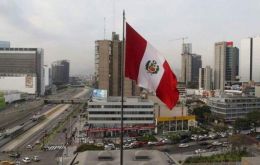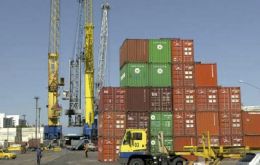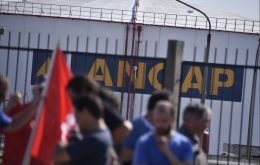MercoPress. South Atlantic News Agency
Economy
-
Thursday, November 3rd 2022 - 10:16 UTC
Peru's post-pandemic economic recovery faster than that elsewhere

Peru quickly bounced back from the COVID-19 pandemic, even if compared with other countries in the region and the world, according to reports released Wednesday in Lima.
-
Wednesday, November 2nd 2022 - 20:23 UTC
Brazil's Economy Ministry reports foreign trade surplus in October

After Sunday's elections and the nationwide protests by supporters of President Jair Bolsonaro who refuse to admit former leader Luiz Inácio Lula da Silva will be once again head of state on Jan. 1, the Economy Ministry released this week a report showing the country had recorded a trade surplus of US$ 3.921 billion in October alone.
-
Wednesday, November 2nd 2022 - 10:45 UTC
Lula and Biden share common views during phone call

US President Joseph Biden and Brazil's President-elect Luiz Inácio Lula Da Silva held a telephone conversation during which they concurred on several issues, it was reported.
-
Wednesday, November 2nd 2022 - 10:11 UTC
Maersk and MSC accused in Brazil of abusing their dominating position in the container business

The Brazilian Association of Port Terminals (ABTP) – a group representing 73 port companies across 235 terminals in Brazil – filed a legal request at Brazil’s Administrative Economic Defense Council (CADE) to investigate Maersk and MSC’s impact on the port market. ABTP accuses the two companies of abusing their domination in the maritime transport of containers business to favor their own terminals, raising costs and reducing options for the flow of cargo in Brazil.
-
Wednesday, November 2nd 2022 - 10:03 UTC
Uruguayan exports fall for the 2nd month in a row

Uruguayan exports in the month of October 2022 totaled US$ 842 million, which represented a 6% year-on-year drop, it was reported Tuesday in Montevideo.
-
Wednesday, November 2nd 2022 - 09:17 UTC
Bank of England begins QE “tightening”; first successful sale of £750 million bonds

The Bank of England sold on Tuesday £750 million worth of UK government bonds from its quantitative easing stockpile. It was the first Western central bank to do so and received a solid demand from investors at its first auction to sell government bonds from its £838 billion pound quantitative easing portfolio.
-
Tuesday, November 1st 2022 - 10:19 UTC
Amid strike, Uruguay's Ancap secures jet fuel supply through imports

Uruguay's state-run oil company has imported jet fuel from Argentina to guarantee a normal supply to keep the international airports of Montevideo and Punta del Este operational amid a workers' strike, it was reported Monday.
-
Tuesday, November 1st 2022 - 10:06 UTC
Argentine wages trail inflation

Salaries in Argentine rose 6.5% on average in August 2022, the National Institute of Statistics and Census (Indec) reported Monday. According to these figures, incomes were below the 7% inflation rate for the same month.
-
Tuesday, November 1st 2022 - 10:00 UTC
Argentine drought will force Brazil to purchase wheat in non-Mercosur suppliers

Brazil will need alternative wheat sources because Argentina, its traditional supplier, is facing a serious crop insufficiency as a result of a serious drought that has curtailed production and compromised export volumes. Market analysts expect Brazil will thus have to look for supplies in potential providers such as the United States, Canada and even Russia.
-
Tuesday, November 1st 2022 - 10:00 UTC
Central banks and stubborn inflation, to Hike, Early to Thrive?

By Andrés Velasco – Several central banks that began raising interests well before US and Euro-zone policymakers are still facing persistent inflation. But it was the right choice, because inflation was always likely to prove stubborn in today’s conditions, and waiting would have required even larger hikes later, with a heavier output cost.
